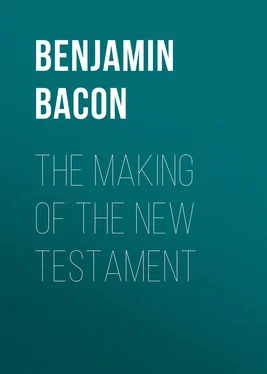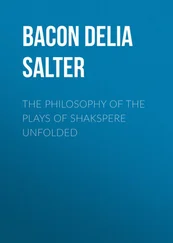Benjamin Bacon - The Making of the New Testament
Здесь есть возможность читать онлайн «Benjamin Bacon - The Making of the New Testament» — ознакомительный отрывок электронной книги совершенно бесплатно, а после прочтения отрывка купить полную версию. В некоторых случаях можно слушать аудио, скачать через торрент в формате fb2 и присутствует краткое содержание. ISBN: , Жанр: foreign_antique, foreign_prose, на английском языке. Описание произведения, (предисловие) а так же отзывы посетителей доступны на портале библиотеки ЛибКат.
- Название:The Making of the New Testament
- Автор:
- Жанр:
- Год:неизвестен
- ISBN:http://www.gutenberg.org/ebooks/39288
- Рейтинг книги:5 / 5. Голосов: 1
-
Избранное:Добавить в избранное
- Отзывы:
-
Ваша оценка:
- 100
- 1
- 2
- 3
- 4
- 5
The Making of the New Testament: краткое содержание, описание и аннотация
Предлагаем к чтению аннотацию, описание, краткое содержание или предисловие (зависит от того, что написал сам автор книги «The Making of the New Testament»). Если вы не нашли необходимую информацию о книге — напишите в комментариях, мы постараемся отыскать её.
The Making of the New Testament — читать онлайн ознакомительный отрывок
Ниже представлен текст книги, разбитый по страницам. Система сохранения места последней прочитанной страницы, позволяет с удобством читать онлайн бесплатно книгу «The Making of the New Testament», без необходимости каждый раз заново искать на чём Вы остановились. Поставьте закладку, и сможете в любой момент перейти на страницу, на которой закончили чтение.
Интервал:
Закладка:
The Making of the New Testament
PART I
CANONIZATION AND CRITICISM
CHAPTER I
INSPIRATION AND CANONIZATION
The New Testament presents the paradox of a literature born of protest against the tyranny of a canon, yet ultimately canonized itself through an increasing demand for external authority. This paradox is full of significance. We must examine it more closely.
The work of Jesus was a consistent effort to set religion free from the deadening system of the scribes. He was conscious of a direct, divine authority. The broken lights of former inspiration are lost in the full dawn of God's presence to His soul.
So with Paul. The key to Paul's thought is his revolt against legalism. It had been part of his servitude to persecute the sect which claimed to know another Way besides the "way" 1 1 Tarik , i. e. "way," is still the Arabic term for a sect, and the Rabbinic term for legal requirement is halacha , i. e. "walk."
of the scribes. These Christians signalized their faith by the rite of baptism, and gloried in the sense of endowment with "the Spirit." Saul was profoundly conscious of the yoke; only he had not drammed that his own deliverance could come from such a quarter. But contact with victims of the type of Stephen, men "filled with the Spirit," conscious of the very "power from God" for lack of which his soul was fainting, could not but have some effect. It came suddenly, overwhelmingly. The real issue, as Saul saw it, both before and after his conversion, was Law versus Grace. In seeking "justification" by favour of Jesus these Christians were opening a new and living way to acceptance with God. Traitorous and apostate as the attempt must seem while the way of the Law still gave promise of success, to souls sinking like Saul's deeper and deeper into the despairing consciousness of "the weakness of the flesh" forgiveness in the name of Jesus might prove to be light and life from God. The despised sect of 'sinners' whom he had been persecuting expressed the essence of their faith in the doctrine that the gift of the Spirit of Jesus had made them sons and heirs of God. If the converted Paul in turn is uplifted – "energized," as he terms it – even beyond his fellow-Christians, by the sense of present inspiration, it is no more than we should expect.
Paul's conversion to the new faith – or at least his persistent satisfaction in it – will be inexplicable unless we appreciate the logic of his recognition in it of an inherent opposition to the growing demands of legalism. Jesus had, in truth, led a revolt against mere book-religion. His chief opponents were the scribes, the devotees and exponents of a sacred scripture, the Law. "Law" and "Prophets," the one prescribing the conditions of the expected transcendental Kingdom, the other illustrating their application and guaranteeing their promise, constituted the canon of the synagogue. Judaism had become a religion of written authority. Jesus set over against this a direct relation to the living Father in heaven, ever presently revealed to the filial spirit. The Sermon on the Mount makes the doing of this Father's will something quite other than servitude to written precepts interpreted by official authority and imposed under penalty. It is to be self-discipline in the Father's spirit of disinterested goodness, as revealed in everyday experience.
Even the reward of this self-discipline, the Kingdom, Jesus did not conceive quite as the scribes. To them obedience in this world procured a "share in the world to come." To Him the reward was more a matter of being than of getting. The Kingdom was an heir-apparency; and, therefore, present as well as future. It was "within" and "among" men as well as before them. They should seek to "be sons and daughters of the Highest," taking for granted that all other good things would be "added." So Jesus made religion live again. It became spiritual, inward, personal, actual.
After John the Baptist's ministry to what we should call the 'unchurched' masses, Jesus took up their cause. He became the "friend" and champion of the "little ones," the "publicans and sinners," the mixed 'people of the land' in populous, half-heathen, Galilee. The burdens imposed by the scribes in the name of 'Scripture' were accepted with alacrity by the typical Pharisee unaffected by Pauline misgivings of 'moral inability.' To "fulfil all righteousness" was to the Pharisee untainted by Hellenism a pride and delight. To the "lost sheep of Israel" whom Jesus addressed, remote from temple and synagogue, this "righteousness" had proved (equally as to Paul, though on very different grounds) "a yoke which neither we nor our fathers were able to bear." Jesus "had compassion on the multitude." To them he "spoke with authority"; and yet "not as the scribes" but as "a prophet." When challenged by the scribes for his authority he referred to "the baptism of John," and asked whether John's commission was "from heaven, or of men." They admitted that John was "a prophet." Those who give utterance after this manner to the simple, sincere conviction of the soul, voicing its instinctive aspiration toward "the things that be of God," are conscious that they speak not of themselves.
Jesus, it is true, was no iconoclast. He took pains to make clear that if he superseded what they of old time had taught as righteousness, it was in the interest of a higher, a "righteousness of God." If he disregarded fasts and sabbaths, it was to put substance for form, end for means. "Judgment, mercy, and good faith" should count more than tithes from "mint and anise and cummin." He echoed what John the Baptist had taught of repentance and forgiveness. Hope should no longer be based on birth, or prerogative, or ritual form, but on the mercy of a God who demands that we forgive if we would be forgiven. Such had been, however, the message not of John only, but of all the prophets before him: "I will have mercy, and not sacrifice." Jesus taught this higher, inward, righteousness; but not merely as John had done. John had said: Repent, for the wrath of God is at hand. Jesus said: Repent, for the forgiveness of God is open. The Father's heart yearns over the wayward sons. Jesus preached the nearness of the Kingdom as "glad tidings to the poor"; and among these "poor" were included even aliens who put "faith" in the God of Abraham.
The new Way started from the same Scripture as that of the scribes, but it tended in an opposite direction. Theirs had been gradually developing in definiteness and authority since the time of Ezra; yes, since Josiah had made formal covenant, after the discovery of "the book of the Law" in the temple, pledging himself and his people to obedience. As with many ancient peoples, the codification of the ancient law had been followed by its canonization, and as the national life had waned the religious significance of the Law had increased. It was now declared to express the complete will of God, for an ideal people of God, in a renovated universe, whose centre was to be a new and glorified Jerusalem. The Exile interrupted for a time the process of formal development; but in the ecclesiastical reconstruction which followed in Ezra's time "the book of the Law" had become all the more supreme; the scribe took the place of the civil officer, the synagogue became local sanctuary and court-house in one, the nation became a church, Israel became 'the people of the book.'
Legal requirement calls for the incentive of reward. We need not wonder, then, that the canon of the Law was soon supplemented by that of the writings of the Prophets, historical and hortatory. The former were considered to interpret the Law by showing its application in practice, the latter were valued for their predictive element. Law and Prophets were supplemented by Psalms, and elements from the later literature having application to the religious system. The most influential were the "apocalypses," or "revelations" of the transcendental Kingdom and of the conditions and mode of its coming. Scripture had thus become an embodiment of Israel's religion. It set forth the national law, civil, criminal, or religious; and the national hope, the Kingdom of God. Its custodian and interpreter was the 'scribe,' lawyer and cleric in one. The scribe held "the key of knowledge"; to him it was given to 'bind and loose,' 'open and shut.' Any preacher who presumed to prescribe a righteousness apart from 'the yoke of the Law,' or to promise forgiveness of sins on other authority, must reckon with the scribes. He would be regarded as seeking to 'take the Kingdom by violence.'
Читать дальшеИнтервал:
Закладка:
Похожие книги на «The Making of the New Testament»
Представляем Вашему вниманию похожие книги на «The Making of the New Testament» списком для выбора. Мы отобрали схожую по названию и смыслу литературу в надежде предоставить читателям больше вариантов отыскать новые, интересные, ещё непрочитанные произведения.
Обсуждение, отзывы о книге «The Making of the New Testament» и просто собственные мнения читателей. Оставьте ваши комментарии, напишите, что Вы думаете о произведении, его смысле или главных героях. Укажите что конкретно понравилось, а что нет, и почему Вы так считаете.












